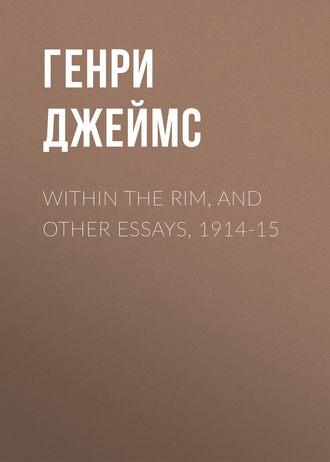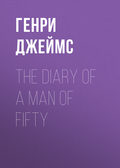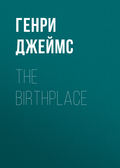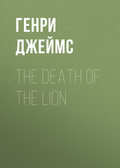
Генри Джеймс
Within the Rim, and Other Essays, 1914-15
This is the palpable and ponderable, the admirably appreciable, residuum—as to which if I be asked just how it is that I pluck the flower of amiability from the bramble of an individualism so bristling with accents, I am afraid I can only say that the accents would seem by the mercy of chance to fall together in the very sense that permits us to detach the rose with the fewest scratches. The rose of active good nature, irreducible, incurable, or in other words all irreflective, that is the variety which the individualistic tradition happens, up and down these islands, to wear upon its ample breast—even it may be with considerable effect of monotony. There it is, for what it is, and the very simplest summary of one's poor bedside practice is perhaps to confess that one has most of all kept one's nose buried in it. There hangs about the poor practitioner by that fact, I profess, an aroma not doubtless at all mixed or in the least mystical, but so unpervertedly wholesome that what can I pronounce it with any sort of conscience but sweet? That is the rough, unless I rather say the smooth, report of it; which covers of course, I hasten to add, a constant shift of impression within the happy limits. Did I not, by way of introduction to these awaiters of acknowledgment, find myself first of all, early in the autumn, in presence of the first aligned rows of lacerated Belgians?—the eloquence of whose mere mute expression of their state, and thereby of their cause, remains to me a vision unforgettable for ever, and this even though I may not here stretch my scale to make them, Flemings of Flanders though they were, fit into my remarks with the English of the English and the Scotch of the Scotch. If other witnesses might indeed here fit in they would decidedly come nearest, for there were aspects under which one might almost have taken them simply for Britons comparatively starved of sport and, to make up for that, on straighter and homelier terms with their other senses and appetites. But their effect, thanks to their being so seated in everything that their ripe and rounded temperament had done for them, was to make their English entertainers, and their successors in the long wards especially, seem ever so much more complicated—besides making of what had happened to themselves, for that matter, an enormity of outrage beyond all thought and pity. Their fate had cut into their spirit to a peculiar degree through their flesh, as if they had had an unusual thickness of this, so to speak—which up to that time had protected while it now but the more exposed and, collectively, entrapped them; so that the ravaged and plundered domesticity that one felt in them, which was mainly what they had to oppose, made the terms of their exile and their suffering an extension of the possible and the dreadful. But all that vision is a chapter by itself—the essence of which is perhaps that it has been the privilege of this placid and sturdy people to show the world a new shade and measure of the tragic and the horrific. The first wash of the great Flemish tide ebbed at any rate from the hospitals—creating moreover the vast needs that were to be so unprecedentedly met, and the native procession which has prompted these remarks set steadily in. I have played too uncertain a light, I am well aware, not arresting it at half the possible points, yet with one aspect of the case staring out so straight as to form the vivid moral that asks to be drawn. The deepest impression from the sore human stuff with which such observation deals is that of its being strong and sound in an extraordinary degree for the conditions producing it. These conditions represent, one feels at the best, the crude and the waste, the ignored and neglected state; and under the sense of the small care and scant provision that have attended such hearty and happy growths, struggling into life and air with no furtherance to speak of, the question comes pressingly home of what a better economy might, or verily mightn't, result in. If this abundance all slighted and unencouraged can still comfort us, what wouldn't it do for us tended and fostered and cultivated? That is my moral, for I believe in Culture—speaking strictly now of the honest and of our own congruous kind.






